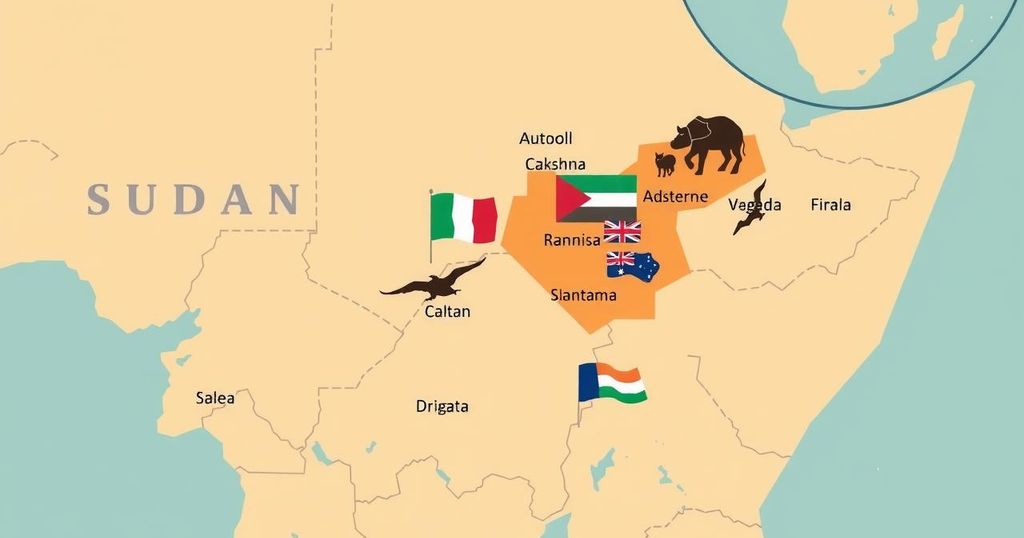Foreign Influence Is Fueling the War in Sudan – Analysis
- The war in Sudan began on April 15, 2023, marking significant clashes between SAF and RSF.
- Ethnic, political, and economic factors shape the roots of Sudan’s lasting conflict.
- Mohamed Hamdan Dagalo, known as Hemedti, leads the RSF amid intense power struggles.
- Foreign nations support SAF and RSF, complicating the conflict further.
- The humanitarian crisis deepens, with millions displaced and lacking aid.
Understanding the Roots of Sudan’s Ongoing Conflict
The War in Sudan: Foreign Influences at Play The violence that has engulfed Sudan since April 15, 2023, between the Sudanese Armed Forces (SAF) and the Rapid Support Forces (RSF) is not merely a local affair. While these two factions clash over control, foreign powers seem to be pulling strings from behind the curtain. It has been two years since the fighting erupted, and despite escalating fatalities and devastation, the conflict continues unabated, largely fueled by international actors supporting both sides seeking control. The ongoing strife isn’t just about local grievances—rather, it’s a complicated mosaic involving centuries of ethnic tensions, political maneuvering, and economic struggles. The overthrow of Omar al-Bashir in 2019, once viewed as a hopeful turning point, has only ushered in a new era of uncertain power dynamics as factional disputes over leadership and governance persist.
Key Players in the Conflict
The Rise of the Rapid Support Forces The RSF’s origins date back to 2013, emerging from the infamous Janjaweed militias that gained notoriety during the Darfur conflict. Established initially to quell rebel activities, the RSF has evolved into a formidable political actor under the leadership of Mohamed Hamdan Dagalo, also known as Hemedti. Dagalo’s rise coincided with a volatile political landscape following al-Bashir’s ousting. Allegations continue to swirl about his alliances and ambitions as he navigates the treacherous world of Sudanese politics. The simmering tensions between him and the SAF leader, General Abdel Fattah al-Burhan, have catalyzed widespread violence; precisely what sparked the latest clashes remains much debated. Still, the stakes are clear: both leaders vie for dominance over the country’s military and political apparatus, dragging the nation further into chaos. The combat has now taken on national dimensions, with fighting spreading across Sudan, causing untold suffering and loss of life.
The Role of Foreign Nations in the Conflict
International Interests Complicating Peace Efforts Foreign interest in Sudan has become a double-edged sword, influencing both the course of the conflict and the humanitarian crisis. Several countries have aligned themselves with the SAF, driven largely by geopolitical ambitions. Egypt is one such player, backing the SAF out of concern for stability along the Nile, vital for its water resources. Saudi Arabia also plays a role, offering financial and logistical backing as it positions Sudan as a counterweight against Iranian sway in the region. On the flip side, the RSF has found favor with foreign allies such as the United Arab Emirates, which sees potential in aligning with Dagalo, and Russia, which funnels weapons and military expertise to the RSF. This web of international engagement in Sudan complicates the pathways to peace as external support extends fighting, impacting aid efforts and worsening living conditions on the ground.
Humanitarian Crisis and Regional Stability
Aid Challenges Amidst Rising Casualties As the conflict rages on, the human toll skyrockets. The war in Sudan has led to over 150,000 deaths and displacement of more than 12 million people. Civilians caught in the crossfire find themselves in a dire humanitarian situation, with aid efforts severely hindered. Refugee camps are overflowing with individuals fleeing violence, and many Sudanese lack access to basic services like food and healthcare. This scenario poses a broader regional challenge, impacting neighboring countries already struggling with their own issues. The influx of refugees and security concerns is straining resources across the border, which inhibits international attempts to mediate peace. Not only is Sudanese instability a local problem; it ripples outward, affecting the entire region’s security framework.
Towards a Potential Resolution
Pathways to a Sustainable Peace Finding a resolution to this conflict appears daunting, considering the hardline stances held by both factions and their foreign backers. Yet, potential avenues exist. Engaging in inclusive dialogue that encompasses all relevant stakeholders, including marginalized communities, could be transformative. This would foster a sense of ownership over the peace process. Furthermore, coordinated international pressure could signal to both sides that continued conflict is not in their interest. Lastly, prioritizing humanitarian efforts to assist affected populations can alleviate immediate suffering. This approach fosters a spirit of cooperation that could serve as a bridge to more formal negotiations. The U.N. and various NGOs could play pivotal roles in this, addressing pressing humanitarian needs while advocating for peace.
The war in Sudan remains a complex and multifaceted issue driven by historical and foreign influences. External support has only intensified fighting, exacerbating poverty and human suffering for millions. However, a push for an inclusive dialogue, coordinated international pressure, and prioritizing humanitarian efforts may offer hope for stabilization and peace.




Post Comment